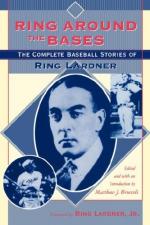|
This section contains 1,631 words (approx. 6 pages at 300 words per page) |

|
SOURCE: "Ring Lardner's The Love Nest': Illusion, Reality, and the Movie Mogul," in The International Fiction Review, Vol. XVI, No. 2, Summer, 1989, pp. 103-05.
In the following essay, Payne describes how the protagonist of "The Love Nest" violently manipulates language to impose his will
Ring Lardner criticism has come a long way since Clifton Fadiman's comprehensive denunciations in his essay of 1933, "Ring Lardner and the Triangle of Hate" ("Except Swift, no writer has gone farther on hatred alone")1 and James T. Farrell's equally sweeping accolades eleven years later in "Ring Lardner's Success-Mad World" ("no other American writer has achieved the mastery of satire which Lardner had")2 More recently, Webb (1960)3 Bordewyck (1982)4 and Gilead (1985)5 have helped to redirect the focus of Lardner commentary, with the result that we are now able to view the author in a more subtle light, as also deeply concerned with "the abusive potentiality of cultural codes...
|
This section contains 1,631 words (approx. 6 pages at 300 words per page) |

|


